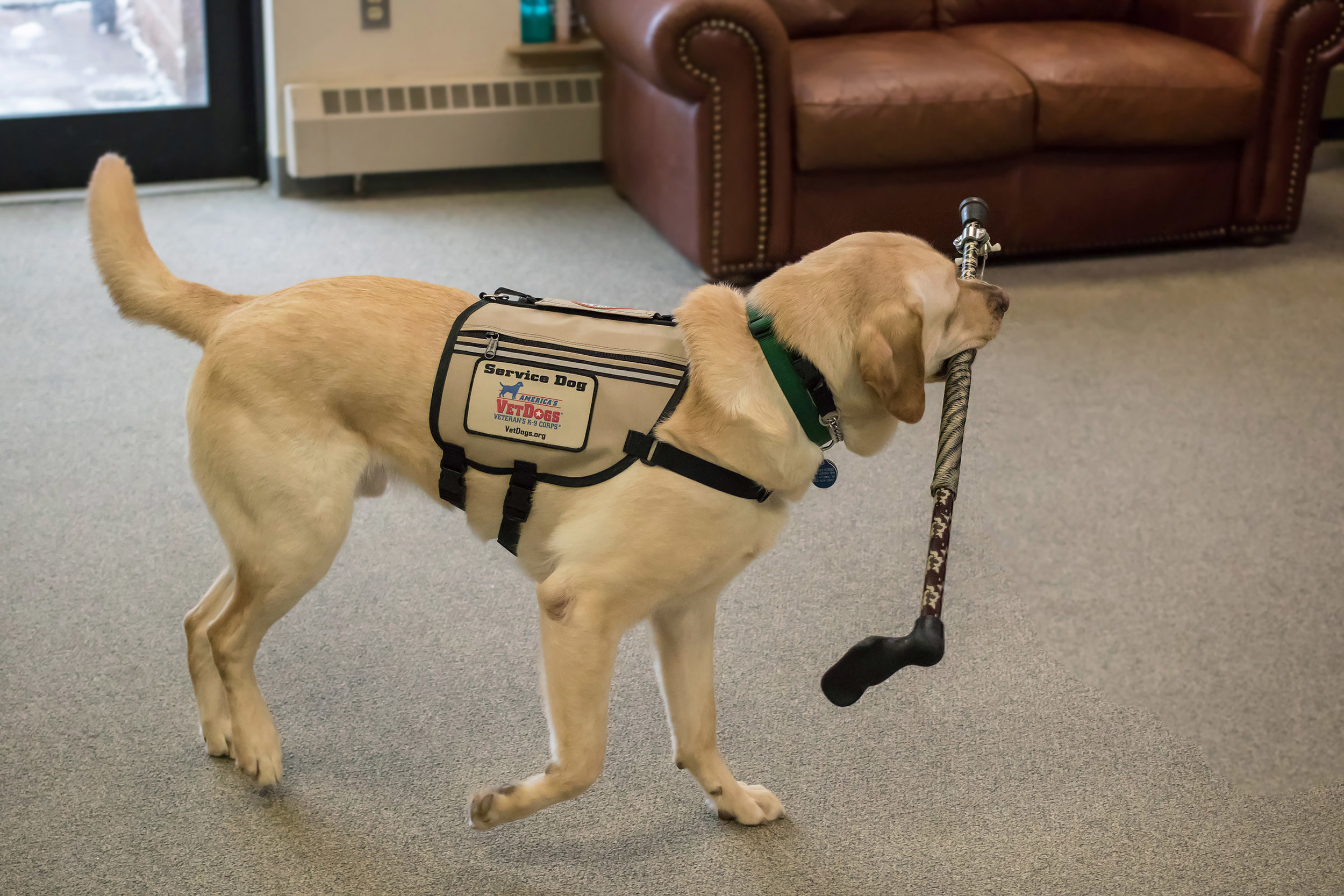At Wags to Wiskers, we get so many dogs in our stores and we absolutely love it. We fall in love with new pets every single day. We often get some questions on how to register your dog as a service dog, or as an emotional support dog. So for today’s pupdate we got the hivemind together to do some research so that we can provide you with all of the necessary knowledge on service dogs and what you need to know before you go sending in applications to the Michigan government!
Service Dogs vs. Emotional Support Dogs
Our southeast Michigan dog owners and pet owners should know right off the bat that there is a difference between a service animal and an emotional support animal. While comfort animals are often used as part of a medical treatment plan, they are not considered service animals under the ADA (Americans with Disabilities Act). They do not have special training to perform tasks that assist people with disabilities, and are not limited to working with people with disabilities. Therefore, comfort animals are not covered by federal laws protecting the use of service animals. Today, we will just be covering service dogs and perhaps in the future we can work on another pupdate for emotional support animals!
What is a Service Dog?
The ADA defines a service animal as a guide dog, signal dog, or other animal individually trained to provide assistance to a person with a disability. If they meet this definition, animals are considered service animals under the ADA regardless of whether they have been licensed or certified by state or local government (more on this later). Service animals perform some of the functions and tasks that the person with a disability cannot perform for him or herself. Guide dogs are one type of service animal, used by some people who are blind. This is the type of service animal with which most people are familiar. Service animals also help people with other kinds of disabilities in their daily activities. Some examples include:
• Alerting persons with hearing disabilities to sounds.
• Pulling wheelchairs or carrying and picking up things for persons with mobility disabilities.
• Assisting persons with mobility disabilities with balance.
It is important for us to tell our southeast Michigan dog owners that a service animal is not a pet! They are different and should be treated and trained differently.
Training a Service Dog
Under the ADA, service dogs must be harnessed, leashed, or tethered, unless the devices interfere with the service dog’s work or the individual’s disability prevents using these devices. In that case, the individual must maintain control of the animal through voice, signal, or other effective controls.
In general, a service dog has to be well-trained. They need to follow basic obedience commands and perform their trained task for your disability. Basic obedience skills are the first step to training a service dog and should include the following commands:
Sit
Stay
Down
Heel
Place
Come
Service dogs must be very well trained beyond basic commands as well. They need to be housebroken so that no accidents happen in public. They need to know proper manners with other humans so that they are not jumping, begging, barking, or playing. Training your dog to be a service animal takes time and effort. For further resources or assistance, please ask a Wags to Wiskers associate!
Registering a Service Dog
Before you apply, it is advisable to check your eligibility for MDCR’s (Michigan Department of Civil Rights) Voluntary Service Animal Identification Program by using the following criteria:
The applicant listed has a disability for which a service animal is required.
The service provided by the animal is not emotional support, companionship, therapy for others, and/or crime deterrence.
The animal is fully trained, not a service animal-in-training.
The animal is housebroken.
The animal can be kept under their handler’s control at all times.
Mandatory registration of service animals is not permissible under the ADA, so although you do not need to register your service animal, it is again advisable to do so. After registration and upon acceptance, you will be eligible to order a canine service vest, complete with identification card and paper certificate records. Michigan has a voluntary identification card and patch available for a service animal upon request through the MDCR that can be requested via email on their website. The best part is that there is no charge for registration! Shocking, we know.
Living with Your Service Dog
If you are taking your service dog to work, it is required for your employer to make reasonable accommodations for your service dog, such as adequate time for potty breaks, feeding, water, extra space, etc.
Service dogs are also allowed in no-pets-allowed buildings or apartments. Under federal law, you are allowed a service animal even if the HOA/landlord does not permit pets, specific breeds, or weight-based limitations. The HOA/landlord are not allowed to request that your service dog prove itself in any way, or that you disclose any sensitive medical information.
Service dogs can also fly with their handlers and are allowed special accommodations on airplanes. Service dogs must be under the seat, cannot block the aisle, and cannot block emergency exits. Apart from that, it’s important to alert the airline prior to flying that you will be traveling with a service dog.
That’s about all we’ve got for today! For more resources and information, check out the following websites or speak with a Wags to Wiskers associate for more localized assistance on service dogs and what you need to know in southeast Michigan!



